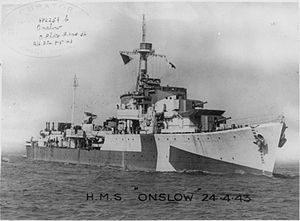 Onslow in 1943
| |
| History | |
|---|---|
| Name | Onslow |
| Ordered | 3 September 1939 |
| Builder | John Brown & Company, Clydebank |
| Laid down | 1 July 1940 |
| Launched | 31 March 1941 |
| Commissioned | 8 October 1941 |
| Decommissioned | April 1947 |
| Fate | Transferred to Pakistan, 1949 |
| Name | PNS Tippu Sultan |
| Namesake | Tippu Sultan |
| Commissioned | 1949 |
| Decommissioned | 1979 |
| Out of service | 1957 |
| Reinstated | 1960 |
| Fate | Scrapped, 1980 |
| General characteristics | |
| Class and type | O-class destroyer |
| Displacement | 1,610 long tons (1,636 t) (standard) |
| Length | 345 ft (105.2 m) (o/a) |
| Beam | 35 ft (10.7 m) |
| Draught | 13 ft 6 in (4.1 m) |
| Installed power |
|
| Propulsion | 2 × shafts; 2 × geared steam turbines |
| Speed | 37 knots (69 km/h; 43 mph) |
| Range | 3,850 nmi (7,130 km; 4,430 mi) at 20 knots (37 km/h; 23 mph) |
| Complement | 176+ |
| Armament |
|
HMS Onslow was an O-class destroyer of the Royal Navy. The O-class were intermediate destroyers, designed before the outbreak of the Second World War to meet likely demands for large number of destroyers. They had a main gun armament of four 4.7 in (120 mm) guns, and had a design speed of 36 kn (41 mph; 67 km/h). Onslow was ordered on 2 October 1939 and was built by John Brown & Company at their Clydebank, Glasgow shipyard, launching on 31 March 1941 and completing on 8 October 1941.
Onslow served with the Home Fleet during the war, with a major activity being escorting Arctic Convoys to the Soviet Union. She sank the German submarine U-589 in September 1942 and in December that year took part in the Battle of the Barents Sea in 1942, while escorting Convoy JW 51B to Russia. The convoy escorts held off attacks from the powerful Admiral Hipper, with Onslow being heavily damaged and her captain, Robert Sherbrooke, severely injured. She also saw detached service in the Mediterranean, covering the Malta Convoy Operation Harpoon in June 1942, and protected invasion shipping in the English Channel from German attack before and after the Normandy landings in mid-1944.
The ship was sold to the Pakistan Navy in 1948, and was renamed Tippu Sultan. Tippu Sultan was converted to a Type 16 anti-submarine frigate from 1957 to 1959, and took part in the 1965 and 1971 wars with India, remaining in service until 1980.